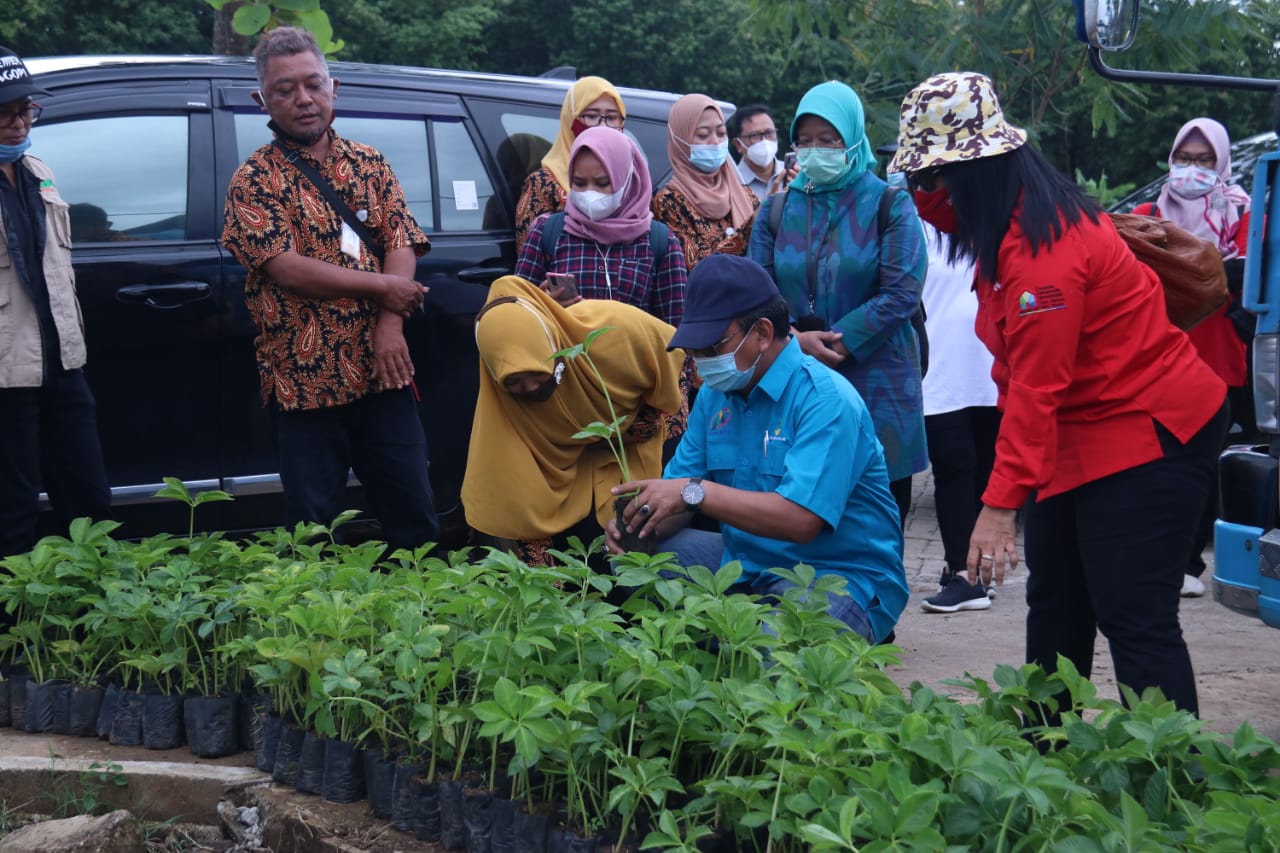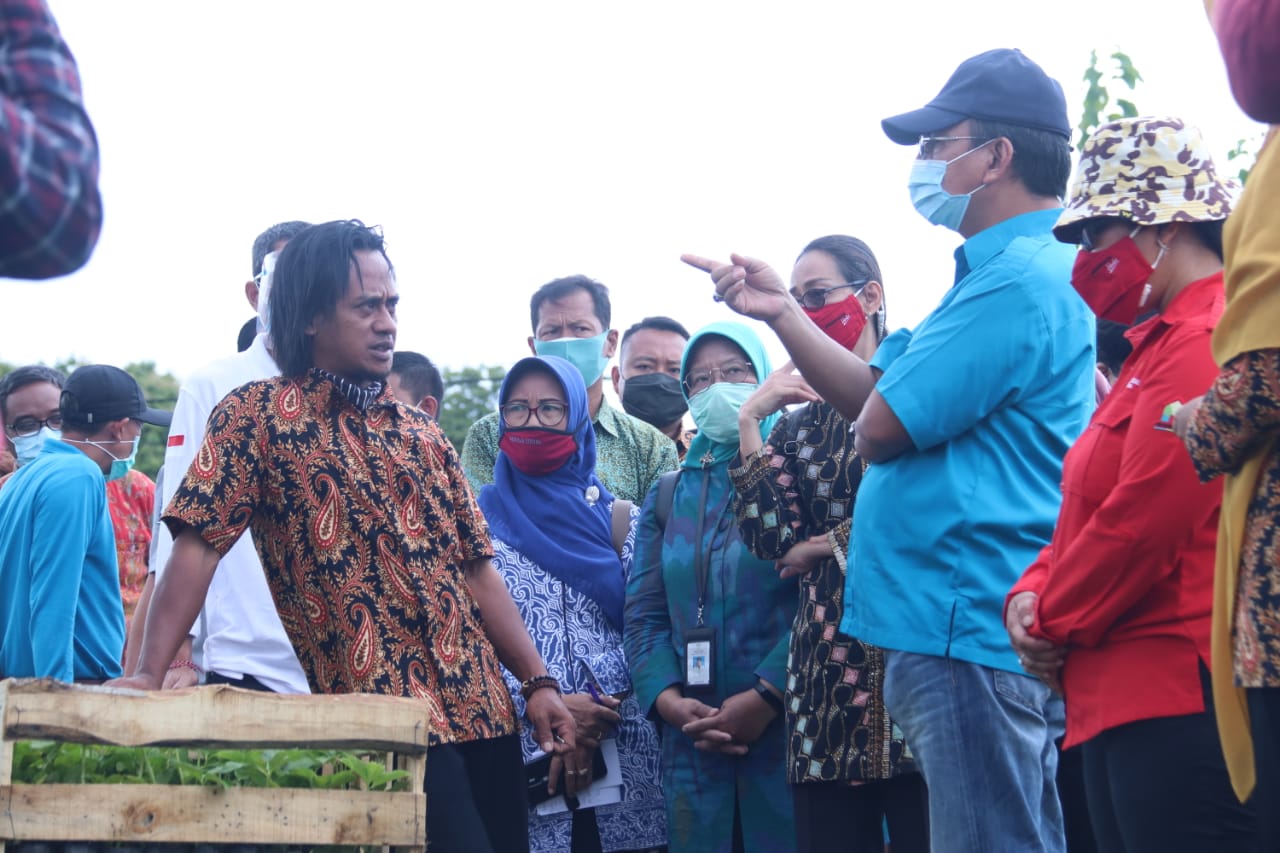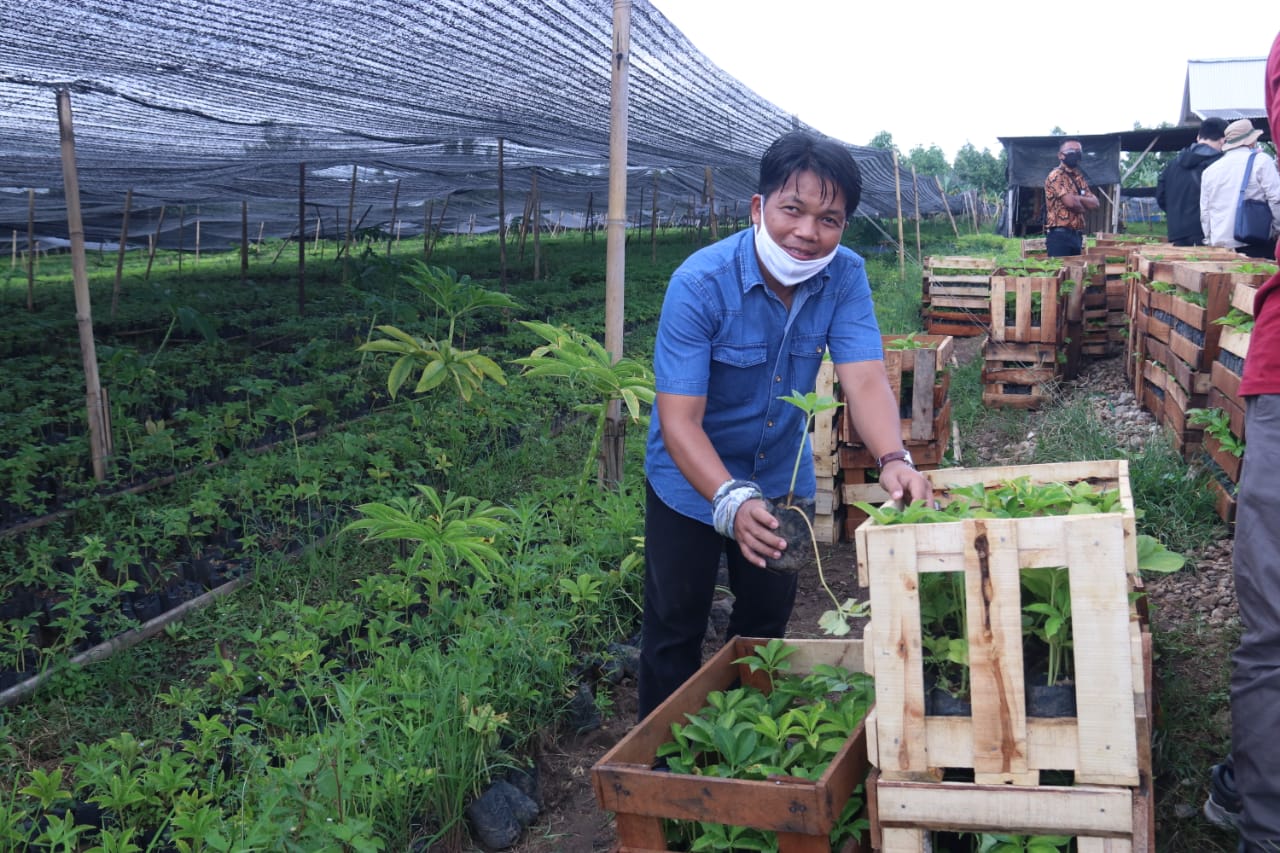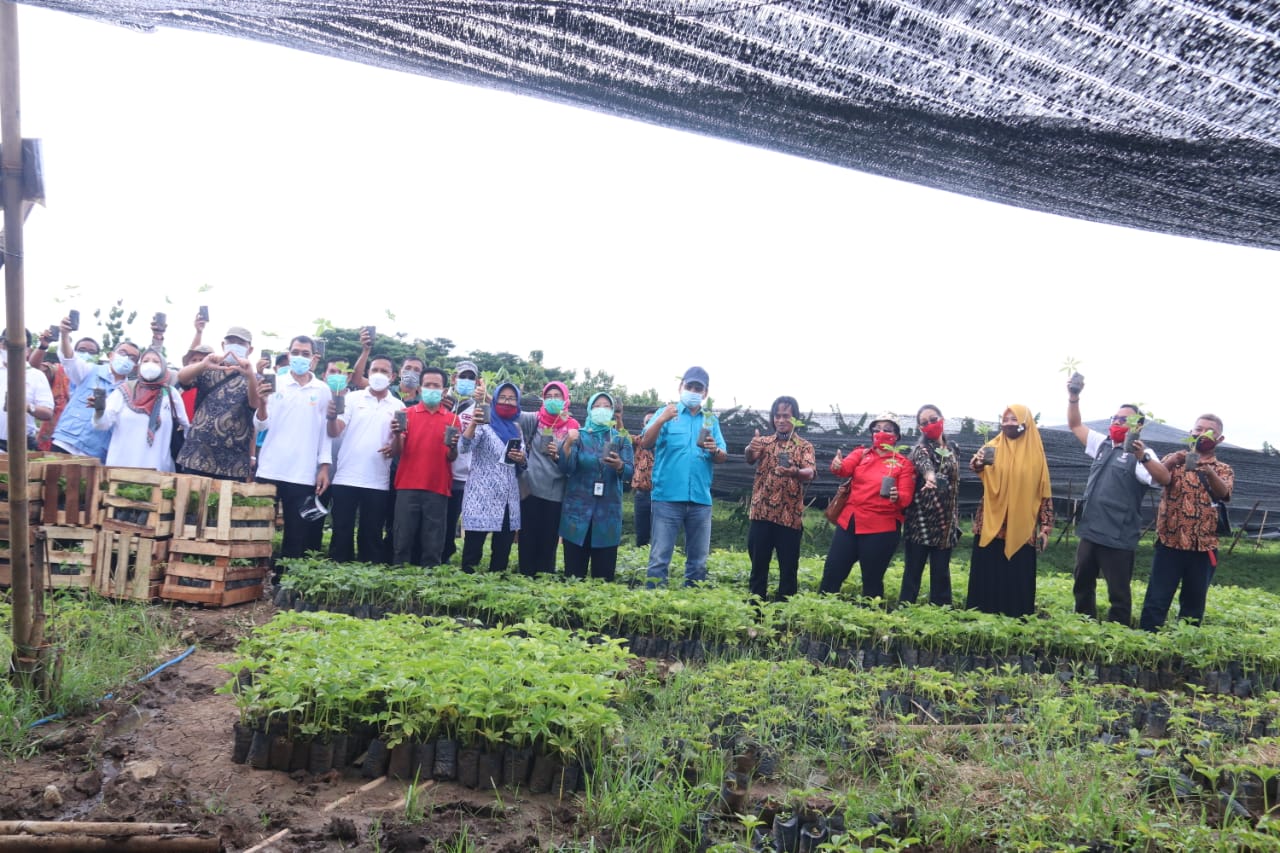MADIUN (January 15, 2021) - The Directorate General of Social Rehabilitation of the Indonesian Ministry of Social Affairs held a comparative study to improve the quality of public services in the Social Rehabilitation Assistance (ATENSI) program, one of which was entrepreneurship support services for Beneficiaries (PM).
A comparative study was conducted at PT. Paidi Indo Porang, Madiun. Director General of Social Rehabilitation, Harry Hikmat said that in accordance with the direction of the Indonesian Minister of Social Affairs, Tri Rismaharini, Social Rehabilitation Centers should utilize open lands that have the potential to be used as urban farming/agriculture with elephant foot yam (porang) as a commodity.
The Minister of Social Affairs recommended porang commodity in terms of economic value, empowerment, and unlimited needs.
Porang plants are easy to cultivate because they can be planted in any type of soil. In addition, porang can be intercropped with any plant and light intensity has no effect on these plants.
Economically, porang plants provide promising profits. From a capital of 1 kg of frogs/pentol (fruit that grows on each branch of the porang stalk) the price is IDR 300,000. In 1 kg there are 150 frogs.
Per frog if planted in 2 seasons or 2 years can produce 2 kg of tubers. So that 150 frogs can produce 300 kg of tubers. In the market, the price of tubers per kg is IDR 10,000. Then the income of 300 kg of tubers is IDR 3 million. From IDR 300,000 as the capital, the generated income can be IDR 3 million.
In addition to economic benefits, the demand for porang is not limited because porang is used as a raw material for the textile industry, as a substitute for cellulose in the film industry, mining, adhesives, food ingredients, imitation materials, cosmetics and health industries. This demand for unlimited needs makes porang a promising and strategic commodity to be cultivated.
In addition, the success story of Paidi, the owner of PT. Paidi Indo Porang, who was originally a scavenger by profession but has now become a billionaire for his commitment to porang cultivation, also motivates the Ministry of Social Affairs to encourage Beneficiaries (PM) in social rehabilitation centers to successfully develop porang cultivation businesses.
Another interesting thing is that Paidi has also taken social actions for the community because he has participated in advancing the welfare of the surrounding community. The porang commodity is also grown by the community in various villages and now has income from planting and selling porang.
"We give to the community about 100 to 200 polybags for nurseries. We ask 10 villages to do porang plant nurseries. The results of the nursery are then handed over to us for us to help market. Later they will benefit from the nursery. That is our form of community empowerment," explained Paidi, former scavenger.
A comparative study was conducted at PT. Paidi Indo Porang, Madiun. Director General of Social Rehabilitation, Harry Hikmat said that in accordance with the direction of the Indonesian Minister of Social Affairs, Tri Rismaharini, Social Rehabilitation Centers should utilize open lands that have the potential to be used as urban farming/agriculture with elephant foot yam (porang) as a commodity.
The Minister of Social Affairs recommended porang commodity in terms of economic value, empowerment, and unlimited needs.
Porang plants are easy to cultivate because they can be planted in any type of soil. In addition, porang can be intercropped with any plant and light intensity has no effect on these plants.
Economically, porang plants provide promising profits. From a capital of 1 kg of frogs/pentol (fruit that grows on each branch of the porang stalk) the price is IDR 300,000. In 1 kg there are 150 frogs.
Per frog if planted in 2 seasons or 2 years can produce 2 kg of tubers. So that 150 frogs can produce 300 kg of tubers. In the market, the price of tubers per kg is IDR 10,000. Then the income of 300 kg of tubers is IDR 3 million. From IDR 300,000 as the capital, the generated income can be IDR 3 million.
In addition to economic benefits, the demand for porang is not limited because porang is used as a raw material for the textile industry, as a substitute for cellulose in the film industry, mining, adhesives, food ingredients, imitation materials, cosmetics and health industries. This demand for unlimited needs makes porang a promising and strategic commodity to be cultivated.
In addition, the success story of Paidi, the owner of PT. Paidi Indo Porang, who was originally a scavenger by profession but has now become a billionaire for his commitment to porang cultivation, also motivates the Ministry of Social Affairs to encourage Beneficiaries (PM) in social rehabilitation centers to successfully develop porang cultivation businesses.
Another interesting thing is that Paidi has also taken social actions for the community because he has participated in advancing the welfare of the surrounding community. The porang commodity is also grown by the community in various villages and now has income from planting and selling porang.
"We give to the community about 100 to 200 polybags for nurseries. We ask 10 villages to do porang plant nurseries. The results of the nursery are then handed over to us for us to help market. Later they will benefit from the nursery. That is our form of community empowerment," explained Paidi, former scavenger.
Harry said that for the Ministry of Social Affairs, this comparative study ensures that porang plants can provide broad opportunities for PMs who are beggars, scavengers, homeless people, children in conflict with the law, people with disabilities, victims of drug abuse and the elderly to become entrepreneurs.
In principle, they have adequate capacity, the cultivation of this porang plant also needs to be adjusted to its potential. It is possible for people with disabilities to maintain this porang plant.
Now the piloting of porang cultivation has been initiated by one of the Social Rehabilitation Centers belonging to the Ministry of Social Affairs, namely "Pangudi Luhur" Training Center in Bekasi which uses 0.5 hectares of its land for porang cultivation. This cultivation activity has involved PMs at "Pangudi Luhur" Training Center in Bekasi.
This cultivation will be expanded to the Social Rehabilitation Centers throughout Indonesia, totaling 41 centers. "This is part of therapy and investment for PM. It's not just taking care of porang," concluded Harry.
Paidi stated his readiness to help cultivate porang plants by PM. "We are ready to help even after the harvest. The market is for factories and exporters," he concluded.
This comparative study was attended by the Director General of Social Empowerment and his staff, the Head of the Social Rehabilitation Center of the Indonesian Ministry of Social Affairs in the Greater Jakarta, Sukabumi, Bandung, Bali and East Nusa Tenggara Regions and the Social Welfare Institutions (LKS) in the Greater Jakarta area.
In principle, they have adequate capacity, the cultivation of this porang plant also needs to be adjusted to its potential. It is possible for people with disabilities to maintain this porang plant.
Now the piloting of porang cultivation has been initiated by one of the Social Rehabilitation Centers belonging to the Ministry of Social Affairs, namely "Pangudi Luhur" Training Center in Bekasi which uses 0.5 hectares of its land for porang cultivation. This cultivation activity has involved PMs at "Pangudi Luhur" Training Center in Bekasi.
This cultivation will be expanded to the Social Rehabilitation Centers throughout Indonesia, totaling 41 centers. "This is part of therapy and investment for PM. It's not just taking care of porang," concluded Harry.
Paidi stated his readiness to help cultivate porang plants by PM. "We are ready to help even after the harvest. The market is for factories and exporters," he concluded.
This comparative study was attended by the Director General of Social Empowerment and his staff, the Head of the Social Rehabilitation Center of the Indonesian Ministry of Social Affairs in the Greater Jakarta, Sukabumi, Bandung, Bali and East Nusa Tenggara Regions and the Social Welfare Institutions (LKS) in the Greater Jakarta area.
 Bahasa
Bahasa
 English
English





